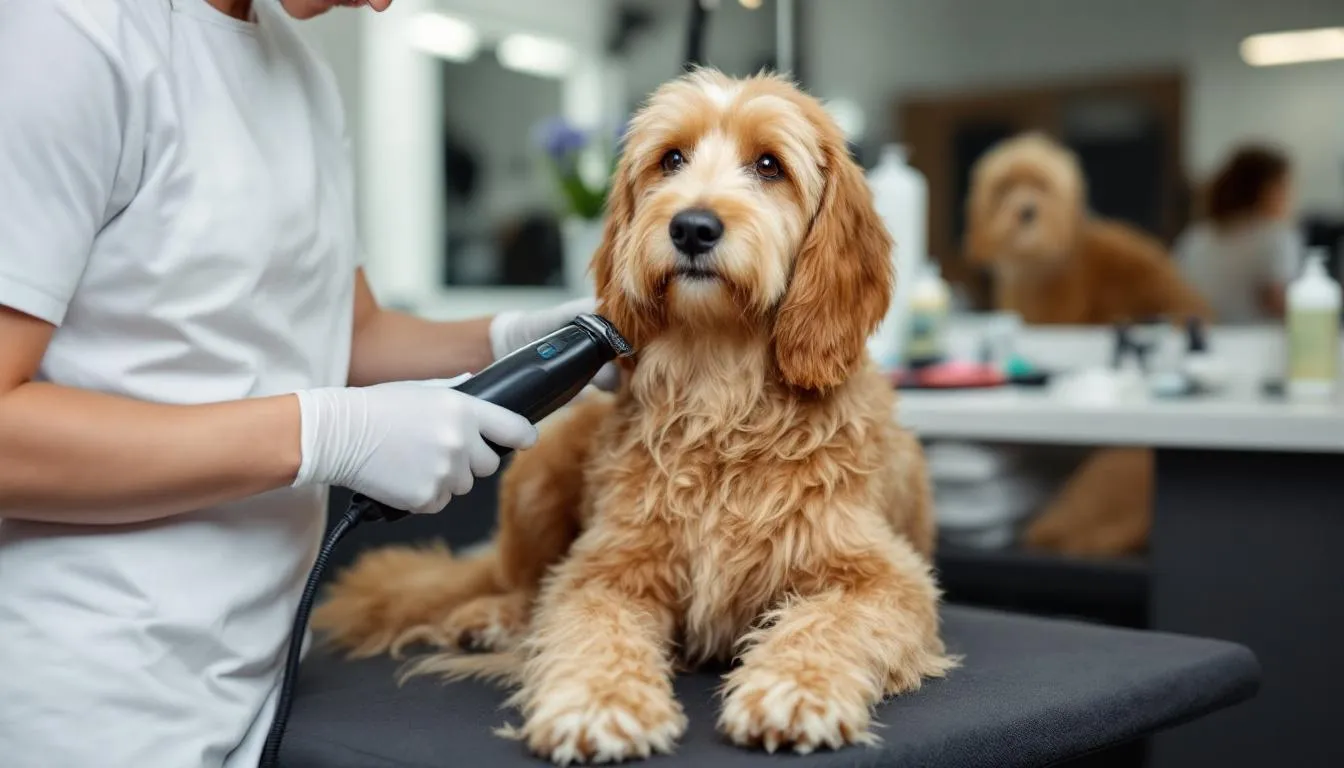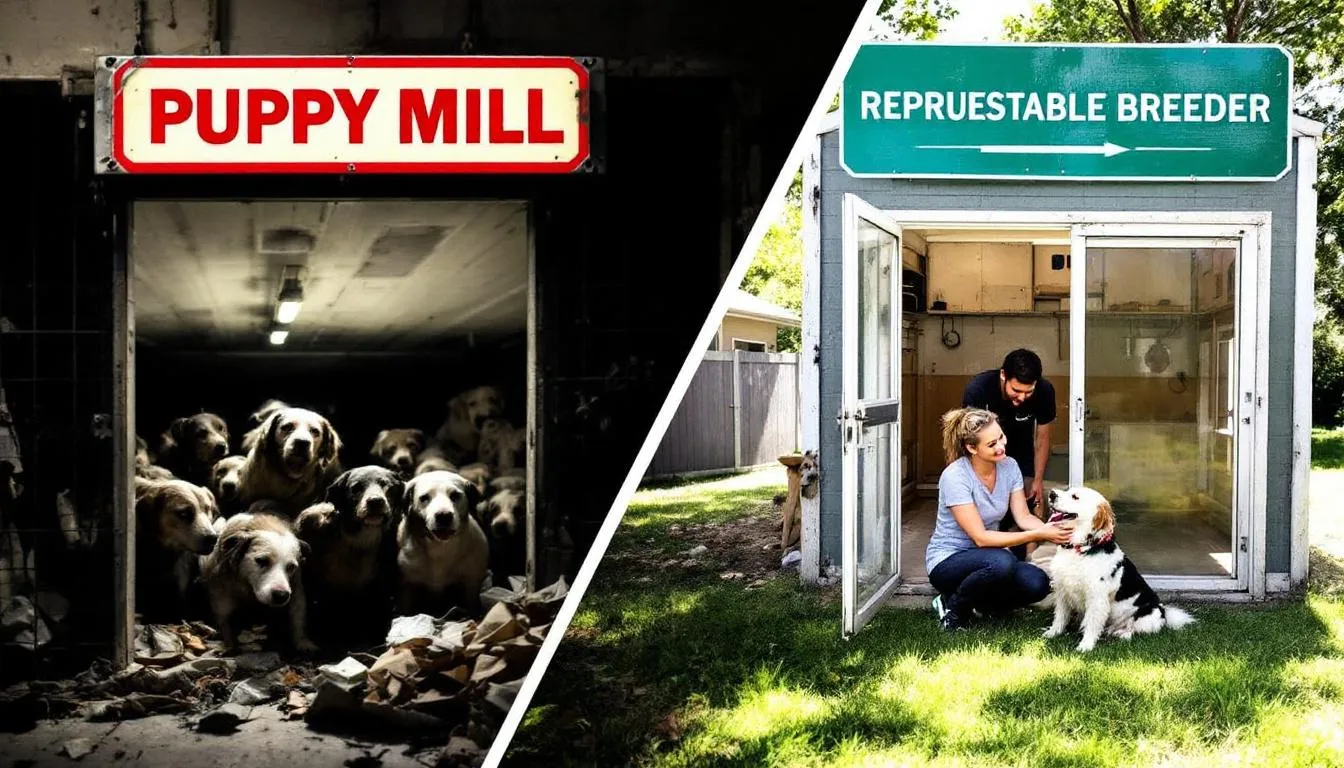Key Takeaways
- Goldendoodle prices range from $2,000 to $5,500 from reputable breeders, with size and generation affecting cost
- Avoid puppies under $1,500 as they often come from puppy mills with health and behavioral issues
- Lifetime ownership costs range from $23,000 to $25,000 including purchase, grooming, veterinary care, and food
- Mini and extra small Goldendoodles command higher prices than standard sizes due to breeding complexity
- Investing in a quality breeder reduces long-term veterinary and training expenses significantly
Goldendoodle prices range from $2,000 to $5,500 from reputable breeders, with size and generation affecting cost
Avoid puppies under $1,500 as they often come from puppy mills with health and behavioral issues
Lifetime ownership costs range from $23,000 to $25,000 including purchase, grooming, veterinary care, and food
Mini and extra small Goldendoodles command higher prices than standard sizes due to breeding complexity
Investing in a quality breeder reduces long-term veterinary and training expenses significantly
You’ve seen those irresistible teddy bear faces on social media and fallen hard for the Goldendoodle charm. But before you start scrolling through puppy listings, let’s talk real numbers. The goldendoodle cost goes far beyond that initial purchase price, and understanding the full financial picture will help you make the smartest choice for your family and budget.
Many prospective owners focus only on the upfront goldendoodle price, but owning a goldendoodle involves monthly expenses, grooming requirements, and potential health costs that add up over their 10-15 year lifespan. This guide breaks down everything from breeder pricing to lifetime ownership costs, helping you budget wisely and avoid costly mistakes.


Goldendoodle Puppy Purchase Prices by Size and Type
The goldendoodle pricing structure varies significantly based on size, with smaller dogs typically commanding higher prices due to breeding complexity and high demand from apartment dwellers.
Standard Goldendoodles represent the most popular size and typically cost $2,000-$4,000 from reputable breeders. These dogs reach 20-22 inches tall and weigh 40-50 pounds, making them ideal for families with yards who want a substantial furry friend without the bulk of larger breeds.
Medium English Goldendoodle pricing falls between $2,500-$4,500, measuring 16-19 inches and weighing 35-55 pounds. This normal size appeals to many families seeking a balance between manageability and presence.
Mini goldendoodles command premium pricing at $2,500-$5,500 due to breeding challenges and higher demand. At 13-16 inches tall and 25-35 pounds, these dogs fit well in smaller homes while maintaining the breed’s beloved temperament.
Extra Small/Toy Goldendoodles represent the highest mini goldendoodle price range at $4,000-$6,000+. Standing just 10-13 inches and weighing under 18 pounds, these tiny companions require careful breeding practices that justify their high price tag.
Teddy Bear Goldendoodles vary widely from $3,000-$6,000 depending on size and specific coat characteristics that create their distinctive fluffy appearance.
Regional variations significantly impact goldendoodle prices across the United States:
|
Region |
Price Range |
|---|---|
|
Western U.S. |
$2,000-$5,000 |
|
Southern U.S. |
$1,600-$3,500 |
|
Midwest |
$1,200-$3,500 |
Region
Price Range
Western U.S.
$2,000-$5,000
Southern U.S.
$1,600-$3,500
Midwest
$1,200-$3,500
Factors That Influence Goldendoodle Pricing
Several key factors determine why one goldendoodle puppy costs significantly more than another. Understanding these variables helps you evaluate whether a breeder’s pricing reflects quality or simply market positioning.
Breeder reputation forms the foundation of goldendoodle pricing. Responsible breeders who invest in comprehensive health testing add $200-$500 to their costs, but this genetic testing prevents expensive health problems down the road. A reputable goldendoodle breeder provides detailed health certificates for parent breeds, showing clear hips, elbows, hearts, and eyes.
Generation type significantly impacts pricing, with F1B Goldendoodles typically commanding $200-$500 premiums over F1 crosses. The F1B generation (75% Poodle, 25% Golden Retriever) offers more predictable hypoallergenic coats, making them highly sought after by families with allergies.
Coat color rarity adds $200-$500 to the purchase price for unusual patterns like merle, parti, or rare colors. While these aesthetic preferences don’t affect temperament or health, the breeding complexity to achieve specific colors increases costs.
Training level dramatically affects pricing. Basic commands and early socialization add $500-$875 to the initial cost, while fully trained dogs from professional dog trainer programs can cost $5,000-$20,000+. However, this investment often saves more money in long term costs by preventing behavioral issues.
Geographic location plays a major role, with urban areas commanding higher prices due to increased demand and higher operating costs for breeders. Travel expenses to transport a new puppy from rural breeders can offset some price differences.


Why the Quality Goldendoodle Cost More
The difference between a $1,500 goldendoodle and a $4,000 one isn’t just marketing—it’s a fundamental difference in breeding practices, health investments, and long-term value.
Reputable breeders invest heavily in comprehensive health testing for genetic disorders common to both parent breeds. This includes hip and elbow dysplasia screening, heart clearances, eye examinations, and genetic testing for conditions like progressive retinal atrophy. These tests cost breeders several hundred dollars per breeding dog but significantly reduce the risk of expensive health problems in goldendoodle puppies.
Early socialization programs from good breeders expose puppies to various sounds, surfaces, and experiences during critical developmental windows. This investment in early socialization prevents behavioral issues that could cost hundreds or thousands in future training classes and property damage.
Proper vaccinations and veterinary care before sale ensure puppies arrive healthy and ready for their new homes. Quality breeders provide detailed health records, making the transition to your veterinarian seamless.
Breeding from champion bloodlines and genetically sound parent dogs requires significant investment in acquiring and maintaining quality breeding stock. These costs get reflected in puppy prices but result in more predictable temperaments and fewer health surprises.
Limited litter sizes focusing on quality over quantity mean responsible breeders produce fewer puppies per year, making each puppy more valuable. Puppy mills that prioritize profit over puppies well being often have larger litters with less individual attention.
Knowing Exactly How Much are Goldendoodles Going to Cost throughout their Lifetime
Adoption presents a more affordable path to goldendoodle ownership, though availability varies significantly by region and comes with different considerations than purchasing from breeders.
Shelter adoption fees range from $250-$900 depending on location, with southern U.S. shelters typically charging $300-$700, midwest shelters $250-$600, and western U.S. shelters $400-$900. These fees usually include spay/neuter surgery, basic vaccinations, and microchipping—services that would cost several hundred dollars separately.
However, goldendoodles remain relatively rare in shelter systems due to their popularity and high resale value. Most available dogs are older or have behavioral issues that led to surrender. While this doesn’t make them bad pets, it may require additional investment in training classes or behavioral modification.
The trade-off involves uncertainty about breeding practices, health testing, and early socialization that comes with shelter dogs. Some adopted goldendoodles develop health problems that could have been prevented through proper genetic testing, potentially leading to higher vet bills long-term.


Monthly and Annual Ownership Costs
The initial cost represents just the beginning of your financial commitment. Monthly expenses quickly add up to substantial annual costs that often surprise new owners.
High-quality dog food costs $50-$60 monthly or $600-$720 annually. Goldendoodles often inherit food sensitivities from their poodle lineage, making premium nutrition important for overall health and coat quality.
Professional grooming represents one of the largest ongoing costs at $400-$450 annually. Most goldendoodles need grooming every 6-8 weeks to prevent matting and maintain their signature teddy bear appearance. You can reduce costs with grooming supplies for basic maintenance between professional sessions, but the curly coat requires expert attention regularly.
Routine veterinary care ranges from $100-$700 annually for basic exams and preventive care. Comprehensive wellness programs that include dental cleanings and advanced screening can push annual vet care costs higher, but they often catch problems early when treatment is less expensive.
Pet insurance costs $30-$70 monthly depending on coverage level and the dog’s age. While optional, pet insurance plans provide valuable protection against unexpected health emergencies that could cost thousands of dollars.
Training classes and ongoing behavioral support typically cost $200-$500 annually, especially during the first few years. Even well-bred goldendoodles need consistent training to channel their intelligence and energy appropriately.
Miscellaneous expenses including toys, treats, nail trims, and occasional boarding or pet sitting add another $200-$300 annually to your budget.
One-Time Setup Costs
New puppy ownership requires initial investments in essential supplies and services that prepare your home for a goldendoodle’s arrival.
Essential supplies including a quality crate, bed, leash, collar, and initial toy selection cost $400-$500. Investing in durable, appropriately-sized equipment from the start saves money on replacements and ensures your dog’s safety and comfort.
Initial vaccinations and health certificates from your veterinarian cost $250-$300, covering the puppy series and establishing care with your local vet. This investment protects your puppy’s health and satisfies local licensing requirements.
Microchipping and registration fees typically run $50-$70, providing permanent identification that helps reunite lost pets with their families. Many areas require microchipping for licensing.
Spay or neuter surgery costs $300-$800 depending on the dog’s size and your location. Most reputable breeders require spaying/neutering in their contracts, and this surgery prevents certain health problems while eliminating unwanted breeding.
Initial training supplies and equipment including treats, clickers, and training tools cost $100-$200. Starting with proper training equipment helps establish good habits from day one.
Dog license and local registration fees vary by municipality but typically cost $15-$50 annually. These fees support local animal control services and are often required by law.
Lifetime Cost Analysis
Understanding the total financial commitment helps you budget appropriately and avoid financial stress during your goldendoodle’s lifetime.
Total lifetime cost estimates range from $23,000-$25,000 over a typical 10-15 year lifespan. This includes the initial purchase price, ongoing monthly expenses, and periodic costs like health emergencies or major dental work.
The purchase price represents only 10-20% of total ownership costs, making the focus on initial price somewhat misleading. A $4,000 puppy from a reputable breeder often costs less long-term than a $1,500 puppy from questionable sources due to health and behavioral problems.
Quality breeding reduces veterinary expenses by preventing genetic disorders that require expensive treatment. Hip dysplasia surgery can cost $3,000-$5,000 per hip, while heart conditions require ongoing medication and monitoring that adds hundreds monthly to vet bills.
Well-trained dogs save money on property damage, emergency vet visits from destructive behavior, and costly behavioral modification later. The investment in early training and socialization pays dividends throughout the dog’s life.
Pet insurance helps manage unexpected costs like cancer treatment ($5,000-$15,000), emergency surgery ($2,000-$8,000), or chronic conditions requiring ongoing medication. Without insurance, these expenses can strain family budgets significantly.


Red Flags: Avoiding Cheap Goldendoodles
Goldendoodle puppies priced under $1,500 almost always come from puppy mills or backyard breeders who cut corners on health, socialization, and ethical breeding practices. These seemingly affordable options often cost much more money in the long haul due to preventable problems.
Lack of health testing documentation represents the biggest red flag. Responsible breeding requires genetic testing for both parent dogs, and legitimate breeders gladly provide certificates. Without this testing, you risk expensive genetic disorders that could have been prevented.
No health guarantees or ongoing breeder support indicates a breeder who doesn’t stand behind their breeding practices. Ethical breeders provide health guarantees and remain available for advice and support throughout the dog’s life.
Always having puppies available without waiting lists suggests a commercial breeding operation focused on quantity over quality. Most reputable breeders have waiting lists because they limit breeding to maintain quality and proper care.
Unwillingness to show parent dogs or breeding facilities often indicates poor conditions or health problems in the breeding stock. Transparent breeders welcome visits and proudly show their facilities and adult dogs.
Higher long-term costs from cheap puppies include increased vet bills for genetic conditions, behavioral issues requiring professional intervention, and potential heartbreak from preventable health problems. The initial savings rarely offset these downstream costs.
Finding Reputable Goldendoodle Breeders
Locating ethical breeders requires research and patience, but the investment protects your family from costly mistakes and ensures a healthier, better-socialized puppy.
GANA (Goldendoodle Association of North America) member breeders follow established ethical guidelines and health testing protocols. While membership doesn’t guarantee quality, it indicates commitment to breed improvement and responsible breeding practices.
Active social media presence and positive community reviews help verify a breeder’s reputation. Look for detailed posts about their dogs, health testing results, and satisfied customer testimonials. Be wary of breeders with no online presence or negative reviews.
Transparent health testing results and breeding practices should be readily available. Good breeders discuss their health testing protocols, explain their breeding goals, and provide detailed information about parent dogs.
Waiting lists often indicate quality breeders who focus on careful breeding rather than constant puppy production. If a breeder always has puppies available immediately, question their breeding frequency and puppy care standards.
Willingness to answer questions and provide references demonstrates confidence in their program. Reputable breeders encourage questions and gladly provide references from previous puppy buyers.
Contracts including health guarantees and spay/neuter requirements protect both breeder and buyer. These contracts outline expectations, health guarantees, and often include clauses about returning the dog if circumstances change.
FAQ
Are Goldendoodles high maintenance dogs?
Yes, goldendoodles require regular brushing 2-3 times weekly and professional grooming every 6-8 weeks to prevent matting. They also need daily exercise and mental stimulation, making them moderately high maintenance compared to some breeds. Their intelligence requires consistent training and enrichment to prevent boredom-related behavioral issues.
Why do groomers charge extra for Goldendoodles?
Goldendoodles have thick, curly coats that require 2-3 hours of grooming time including detangling, trimming, and styling. This complexity justifies the $80-$150 grooming fees compared to shorter-coated breeds. The coat texture also dulls grooming tools faster, increasing equipment costs for professional groomers.
What’s the difference between F1 and F1B Goldendoodles in pricing?
F1B Goldendoodles (75% Poodle, 25% Golden Retriever) typically cost $200-$500 more than F1s because they have curlier, more hypoallergenic coats and require more selective breeding practices. The increased poodle genetics make coat characteristics more predictable, appealing to families with allergies.
Is pet insurance worth it for Goldendoodles?
Yes, pet insurance is recommended for goldendoodles as they can face expensive health issues like hip dysplasia ($1,500-$3,000) and eye problems ($3,000-$4,000). Insurance helps manage these unexpected costs and provides peace of mind for major medical emergencies that could otherwise strain family budgets.
How long do I need to wait for a Goldendoodle puppy from a reputable breeder?
Quality breeders typically have 6-18 month waiting lists, especially for popular sizes like mini goldendoodles. Breeders with immediate availability may not follow proper breeding practices or may be operating commercial puppy mills. Patience for the right breeder prevents costly problems later.
FAQ
Are Goldendoodles high maintenance dogs?
Yes, goldendoodles require regular brushing 2-3 times weekly and professional grooming every 6-8 weeks to prevent matting. They also need daily exercise and mental stimulation, making them moderately high maintenance compared to some breeds. Their intelligence requires consistent training and enrichment to prevent boredom-related behavioral issues.
Why do groomers charge extra for Goldendoodles?
Goldendoodles have thick, curly coats that require 2-3 hours of grooming time including detangling, trimming, and styling. This complexity justifies the $80-$150 grooming fees compared to shorter-coated breeds. The coat texture also dulls grooming tools faster, increasing equipment costs for professional groomers.
What’s the difference between F1 and F1B Goldendoodles in pricing?
F1B Goldendoodles (75% Poodle, 25% Golden Retriever) typically cost $200-$500 more than F1s because they have curlier, more hypoallergenic coats and require more selective breeding practices. The increased poodle genetics make coat characteristics more predictable, appealing to families with allergies.
Is pet insurance worth it for Goldendoodles?
Yes, pet insurance is recommended for goldendoodles as they can face expensive health issues like hip dysplasia ($1,500-$3,000) and eye problems ($3,000-$4,000). Insurance helps manage these unexpected costs and provides peace of mind for major medical emergencies that could otherwise strain family budgets.
How long do I need to wait for a Goldendoodle puppy from a reputable breeder?
Quality breeders typically have 6-18 month waiting lists, especially for popular sizes like mini goldendoodles. Breeders with immediate availability may not follow proper breeding practices or may be operating commercial puppy mills. Patience for the right breeder prevents costly problems later.






